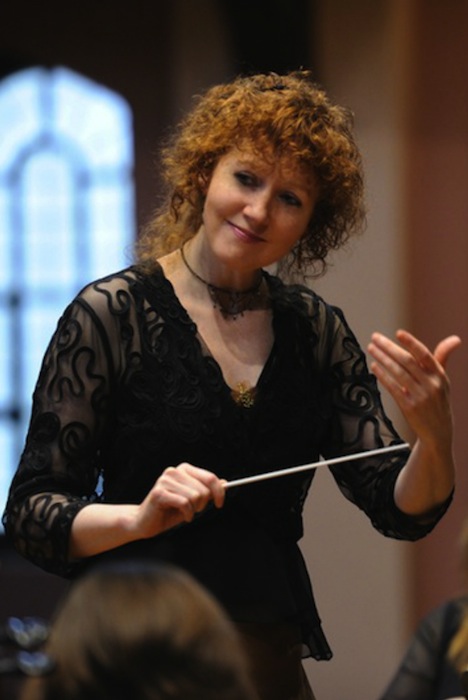Sorrell leads NSO in a vital and theatrical “Messiah”

Jeannette Sorrell conducted the National Symphony Orchestra in Handel’s “Messiah” Thursday night at the Kennedy Center.
The National Symphony Orchestra, like many American orchestras, performs Handel’s Messiah each December. For many, it is one of the incontrovertible rituals of this time of year.
To its credit, the NSO invites a different guest conductor each season, to conduct different versions of this evergreen score. This year Jeannette Sorrell led a pared-down interpretation, leaning toward Handel’s more theatrical side to inject some drama into this music, which can often be too well-behaved in other hands.
For the third year in a row the University of Maryland Concert Choir took the choral part, the backbone of the oratorio. Well prepared by their director, Edward Maclary, they were a nimble presence, agile in the rapid runs and able to turn on a dime with Sorrell’s sometimes capricious modifications of tempo. They responded with conviction to Sorrell’s fast tempos and detached articulation.
Sorrell mostly kept the volume of the orchestra, reduced to a score of string players and playing mostly without vibrato, far below that of the singers. A pair of oboes, seated at the back of the violin section, were almost imperceptible in the texture. The sound revealed from the choir was strong and centered on the pitch, with a minimum of vibrato. On the other hand, Sorrell gave extra weight to the bass line, adding a bassoon to double the cellos and basses and often leaning on its foundational sound.
The soloists were matched to this conception of the piece, mostly smaller in vocal force and with a dramatic edge. Tenor Karim Sulayman floated notes beautifully in lighter pieces like “Comfort Ye,” but when he needed angry power, as at the top of “Thou shalt break them,” the sound was more like a shout. Soprano Sophie Daneman went most comfortably with Sorrell’s almost rash pacing of the recitatives, making her sequence of pieces announcing the birth of Christ into a small operatic scene. Her voice has faded over the last decade, leading to problems of intonation and overextension in “Rejoice greatly.”
Baritone Christian Immler was solid vocally, if not overpowering, and mostly drowned out by the precarious trumpet playing of Steven Hendrickson in “The trumpet shall sound.” It was mezzo-soprano Ann McMahon Quintero who stood out for her brassy tone and chesty low notes, as well as her flashy cadenzas, as in “But who may abide,” which Handel later reworked for an alto castrato.
Sorrell often led from the harpsichord, especially in solo pieces. When she climbed onto a small podium to conduct the choral pieces, the chamber organ, in the capable hands of William Neal, took over the continuo part. With a second harpsichordist who took over the continuo at some points, there was a pleasing variety of texture. The combination of bobbing head and occasional hand gestures was not always enough to keep the ensemble together, however, with the orchestra sections parting ways in “O Thou that tellest” for a few measures.
Sorrell has cut sizable portions from Parts II and III of the score, plus using shortened versions of some pieces, to keep the performance to about two and a half-hours with a single intermission. Yet she added many intriguing touches to the evening, including bagpipe-like ornaments on the bass line in the “Pastoral Symphony” and having the trumpets play from the balcony in the angel chorus, “Glory to God.” The reduction of some solo arias, like “I know that my redeemer liveth,” to just solo violin, solo cello, and harpsichord provided some welcome diversification of orchestral texture.
The oddest moment occurred when the sopranos and basses of the choir left the stage and filled part of the two aisles in the house, where they sang “He trusted in God.” It was unclear why Sorrell would want to draw attention to that particular piece, but the gesture at least woke up some listeners from their slumber.
The program will be repeated 8 p.m. Friday and Saturday, and 1 p.m. Sunday. kennedy-center.org; 202-467-4600.



Posted Dec 15, 2017 at 7:08 pm by Laura Youens
What a vivid review!